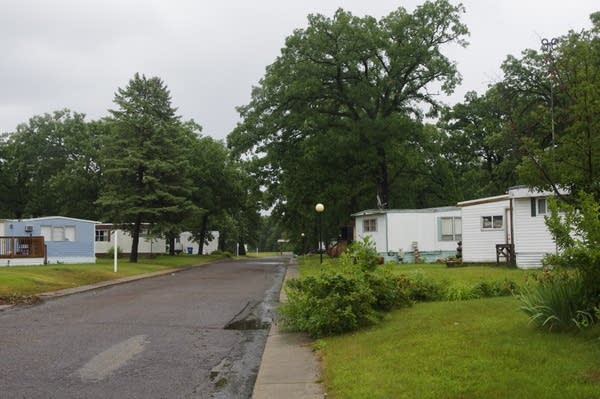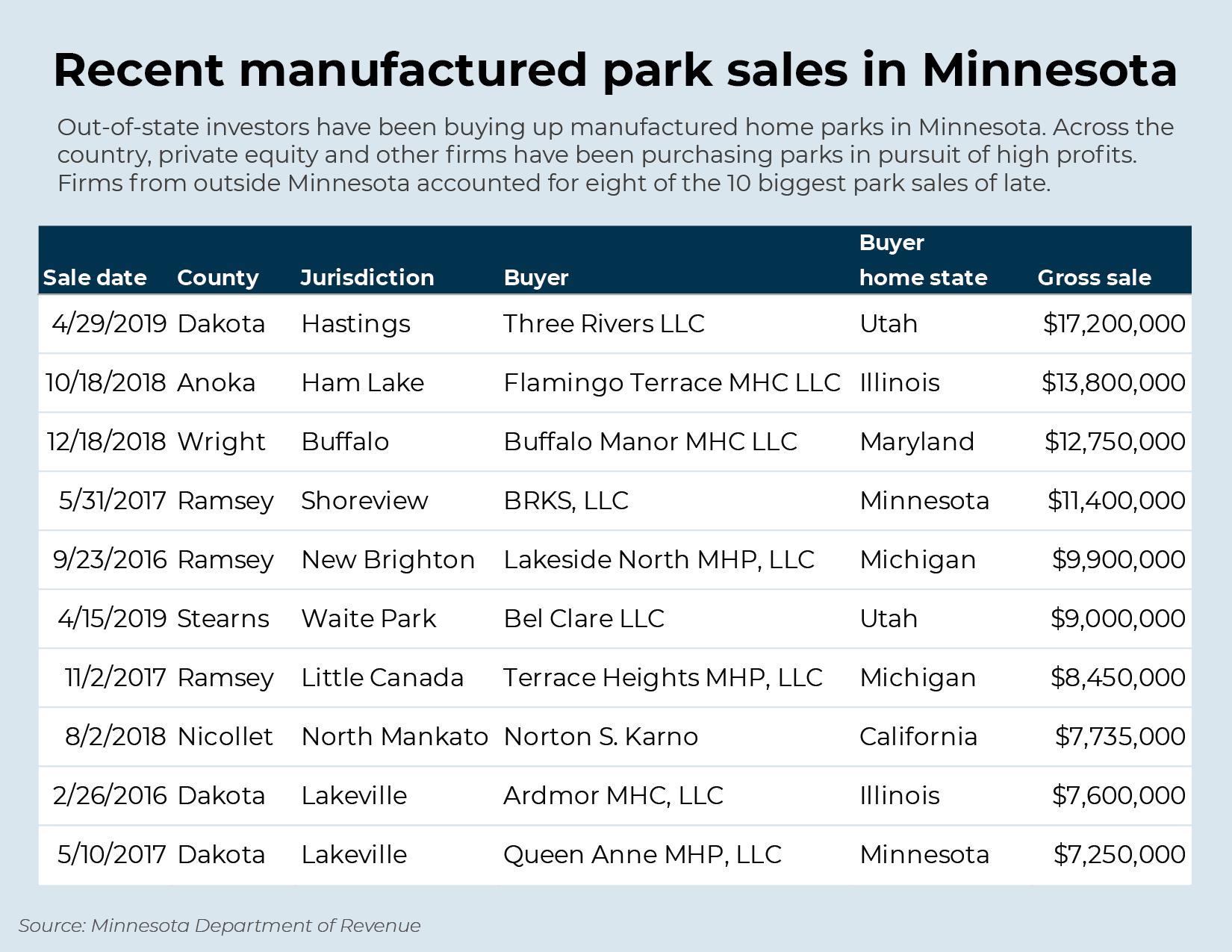Not enough affordable housing? What about mobile homes?

Go Deeper.
Create an account or log in to save stories.
Like this?
Thanks for liking this story! We have added it to a list of your favorite stories.
Updated: 12:21 p.m., Aug. 12 | Posted: 4 a.m., Aug. 7
Manufactured homes — or mobile homes as they are often called — provide inexpensive housing for an estimated 180,000 Minnesotans residing in about 900 parks. Some housing advocates would like to see more such homes, given their affordability and the generally high quality of the current generation of manufactured homes.
New manufactured homes are much less expensive than traditional stick-built homes — with prices often starting at about $60,000. Older homes can be picked up for $10,000 or less.
But most mobile home residents don’t own the land they live on. They rent it.
In Waite Park, Minn., just outside St. Cloud, residents of Bel Clare Estates complain that a new owner is hitting them with steep rent increases for their lots. Retired veteran Kevin Callander said his rent will jump to about $500 a month.
Turn Up Your Support
MPR News helps you turn down the noise and build shared understanding. Turn up your support for this public resource and keep trusted journalism accessible to all.
"The rent increase they're suggesting is 23-something percent,” he said. “My cost of living raise from the federal government was 2.8 percent," Callander said.

The some 160 households in the park are forming a resident association, lining up legal help and preparing to fight back. They're exploring whether state law gave them the right to buy the park when it went up for sale.
"They're coming in and being unreasonable because all they care about is, ‘What kind of profit am I going to make at the end?’" said Douglas Reek, one of the effort’s leaders.
The new owner, Havenpark Capital Partners declined to be interviewed for this story. Residents say Havenpark contends that rents have been below industry standards.
The company created widespread discontent in Iowa after buying parks there and hiking some rents by nearly 70 percent.
Havenpark paid $9 million for the Waite Park property. In a filing with the state, the company said, "We paid higher than market because we are aggressively trying to enter the market and get a presence." The company also recently purchased a park in Hastings, Minn., for $17.2 million and another in Becker, Minn., for $2 million.

Havenpark has said in the past that its acquisitions have actually saved parks from commercial and other developments that would have forced residents to move. The company also said it invests heavily in its parks in Minnesota and elsewhere. It does not disclose how many parks it currently owns or where they are.
At its three Minnesota properties, Havenpark said it raised rents $48 a month, a 12 to 18 percent increase. The company said this was necessary to fund park improvements. That includes spending $1 million so far this summer on new roads and trimming trees.
In a statement, the company said, "The vast majority of our residents appreciate the upgrades we make in the communities and understand that the rates we charge are in line with the local market level. Since most residents own their own homes, they also appreciate the fact that should they choose to sell their home to an incoming resident, they can command a higher price since the community looks better due to the capital improvements we have made."
In marketing materials for potential investors, Havenpark has touted a much different value proposition. The documents are not publicly accessible anymore. But they can be found on the internet as archived web pages, and the company did not contest their authenticity.
The company boasts that its investments in manufactured home parks produce a generous and dependable profit. The company has said park maintenance expenses are low and tenant turnover is minimal because it can cost about $6,000 to move a home.
Havenpark notes that few, if any, new parks are being built, and there’s been a steady pattern of closures. The firm said this creates an opportunity to increase profits at remaining parks because there is a “supply imbalance that is driving up rental and occupancy rates." It promises investors it will only "acquire properties that generate a significant … cash flow from day one."
To be sure, Havenpark isn't the only firm seeing big profits in manufactured home parks. Lots of private equity firms have been buying up parks across the country.
The trend caught the attention of comedian John Oliver, who lampooned some industry players for how they treat residents.
Minnesota Attorney General Keith Ellison said he’s looking into complaints about everything from poor park maintenance to hefty rent increases. Ellison said many parks are fairly operated. But the field is ripe for exploitation.
”It's a lucrative business model for the unethical,” he said.
Some housing experts argue the country should encourage resident-owned manufactured housing developments, given the low cost and quality of the homes these days.
"The question is: Why are so few manufactured homes being shipped each year when it's such an affordable source of housing and we have an affordable housing crunch,” said Laurie Goodman, co-director of the Housing Finance Policy Center at the Urban Institute, a think tank in Washington D.C.
For one thing, many communities impose zoning restrictions to keep out manufactured homes and the people living in them. Manufactured home shipments are less than a third of what they were back in the late 1990s.
Goodman said factory-made homes are a good deal for poor people, especially if they buy the land under the homes.
"A $120,000 mortgage at a 5 percent interest rate would be a payment of $644 a month," she said. "It's going to be more affordable than most rentals.”
Not to mention the mortgage payment on a traditional home.
When people finance homes on land they do not own, though, they pay higher interest rates on loans and the term of the loans is shorter.
The Metropolitan Council says manufactured homes house some of the poorest people, and does so at no cost to the taxpayer.
"It's an incredibly affordable source of affordable housing — even more affordable than some federally subsidized affordable housing programs like Section 8 vouchers or public housing," said Tara Beard, a housing policy analyst with the Metropolitan Council.
There's more interest in preserving existing manufactured housing, Beard said, but there’s little enthusiasm for opening new parks.
“We are not hearing interest from communities to create new manufactured home communities at this point,” she said.
Several Minnesota parks have been lost to redevelopment in the past few decades.
A Walmart replaced Collins Mobile Home Park in Bloomington in 1994. A condo developer bought Shady Lane Court in Bloomington in 2006. Spring Lake Park’s Mobile Home Park closed in 2014 as its owners sold the property for redevelopment.
Most recently, Lowry Grove in St. Anthony was slated for redevelopment. Residents were cleared out. But the development plans fell through and the owner is trying to revive the site as a manufactured housing park.
Minnesota Housing, the state’s housing finance agency, is trying to help existing parks and residents cope with a range of issues — from infrastructure upgrades to tenant purchases of parks.
Since January 2018, Minnesota Housing has financed over 70 loans to homeowners to improve the safety, livability or energy efficiency of their manufactured homes. The state agency is distributing $2 million in grants for improvements in manufactured home parks and infrastructure.

Arguably, the best path to preserving manufactured home parks is to have residents own them. About eight years ago, residents of the Park Plaza Cooperative in Fridley bought their community with the assistance of a foundation that helped them figure out how to finance the $4.3 million deal. It’s one of about a dozen parks in Minnesota and Wisconsin that are resident-owned.
Developers covet the Park Plaza land, said Natividad Seefeld, president of the cooperative. But now the 79 households living there control their fate. Their homes and the land they occupy belong to the residents.
“It's a place where you can plant your two feet, call your home and raise your children or just yourself and still afford to do things,” she said.
Share your experience and help inform our journalism

